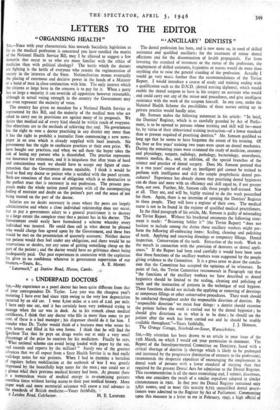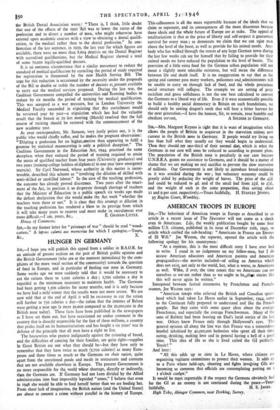SIR,—My attention has been drawn to an article in your
issue of the 15th March, on which I would ask your permission to comment. The Report of the Interdepartmental Committee on Dentistry, faced with a critical shortage of dentists (a shortage which is likely to be prolonged and increased by the progressive diminution of entrants to the profession), recommends the desperate expedient of encouraging the employment in dental work of persons with a lower standard of training than that required by the present Dental Acts for admission to the Dental Register. This recommendation is all the more astonishing and, I submit, disastrous, when one considers the result of a similar expedient adopted in similar circumstances in 1921. In that year the Dental Register contained only 5,831 names, and to meet this scarcity 6,723 unqualified dental practi- tioners wore admitted to the Register by Act of Parliament. Commenting upon this measure in a letter to me in February, 1945, a high official of the British Dental Association wrote: " There is, I think, little doubt that one of the effects of the 1921 Act was to lower the status of the profession and to divert a number of men, who might otherwise have entered upon academic courses with a view to obtaining a dental qualifi- cation, to the medical rather than to the dental profession." In con- firmation of the last sentence, in 1939, the last year for which figures are available, there were no more than 8,604 dentists on the Dental Register with accredited qualifications, but the Medical Register showed a total of some 70,000 legally-qualified doctors.
It is an ominous circumstance that a similar movement to reduce the standard of medical qualification by curtailing the period of study required for registration is threatened by the new Health Service Bill. The urge for this reduction is occasioned by the necessity under the proposals of the Bill to double or treble the number of doctors aLpresent available to carry out the medical services proposed. During the late war, the Coalition Government compelled the universities and licensing bodies to reduce by six months the period of training for medical qualification. This was accepted as a war measure, but in London University the Medical Faculty succeeded in stipulating that this curtailment would be reviewed year by year—o stipulation which has had the valuable result that the Senate at its last meeting (March) resolved that the full course of training should be restored with the commencement of the new academic year.
As your correspondent, Mr. Samson, very justly points out, it is the public who would chiefly suffer, and he makes the pregnant observation: "Diluting a profession for no higherjmotive than appearing to fulfil a promise by statistical manoeuvring is only a political deception." The Coalition Government in the Education Act, 1944, practised the same deception when they reduced the period of training required to attain the status of qualified teacher from four years (University graduates) and two years (training-college holders of diplomas) to one year (new emergency recruits). Sir Cyril Norwood, whose authority in this matter is incon- testable, described this scheme as "involving the dilution of skilled with semi-skilled or unskilled labour." In the case of the teaching profession, the outcome has already proved disastrous. Two years after the enact- ment of the Act, its position is so desperate through shortage of teachers that the Minister of Education in a public speech six weeks ago made the defiant declaration that she would make the Act work "whether the teachers were there or not." It is clear that this attempt at dilution in the teaching profession has rendered a blow to its prestige from which it will take many years to recover and must make its recruitment ever































 Previous page
Previous page